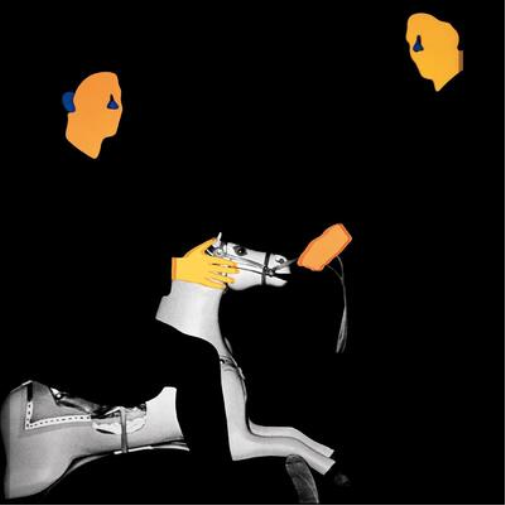“When the day is born and life is ending. But it’s neither created nor destroyed. There’s way to quiet all the noise. ‘Cause it’s only a different kind of gain.” Six years ago on 2018’s Little Dark Age, MGMT’s lead vocalist Andrew VanWyngarden’s bemoaned about the pitfalls of modern technology (phone addiction, gadgets, cyberbullying et al.) but now entering into his forties and welcoming a baby daughter (Phradie, as name dropped on song ‘Phradie’s song’) into his existence the once cynical and cryptic songwriter has started viewing life as an uncontrollable cycle that shouldn’t be feared but embraced with love and joyful acceptance. He aims to spread this newfound simplified outlook on the awe-inspiring Loss Of Life.
Listening to the fifth record from Andrew VanWyngarden and long term friend Ben Goldwasser is a feast for the ears. Production-wise (teaming up with Patrick Wimberley again, like with their predecessor) it ambitiously takes listeners on an adventurous sonic journey playing around with stereo/mono wall of noise with its choice of instruments (on top the guitars and pianos are trumpets, harpsichords, harmonica and french horn, among other music tools). Add to it the captivating lyrics that while retaining some of MGMT’s symbolic songwriting have intellectual messages within about love and the human psyche that can be for the most part understood.
To demonstrate the cyclical nature of humanity, as well MGMT’s precise production decisions, Loss Of Life begins with ‘Loss Of Life (part 2)’ and ends with ‘Loss Of Life’. In a similar track order technique to Arcade Fire’s Everything Now album, it’s meant to represent the album’s continuous loop. Everything that ends springs a new beginning; or specifically in VanWyngarden’s case, when you bring a child into the world your own life of individual freedom ceases to exist.
The opener ‘Loss Of Life (Part 2)’ hears an English professor reading a 6th century English poem called I am Taliesin to help bring the concept to life. “Taliesin, I sing perfect metre. Which will last to the end of the world / I have been dead, I have been alive. I am Taliesin.” MGMT play with the shape of the voice – contorting it while making it travel from one ear to the other and taking what initially sounds like an old BBC narrated children’s story and distorting to sound like the sinister character from 1990s CBBC horror The Demon Headmaster. The instruments that accompany it also change the mood; at one moment it sounds like an informative tanoy announcement, then the next the innocence of The Magic Roundabout, before eventually leading us to creepy basement of Tales From the Cryptkeeper. The other song at of the bookend is ‘Loss Of Life’, which replaces the professor’s story-reading with Van Wyngarden calmingly leading us through a kaleidoscope tunnel of rebirth: twinkling space buttons, regal trumpets that belong to The Beatles‘ ‘Penny Lane’, Arca-produced explosions and aquatic sensations. It’s as if we are being lead by Willy Wonka through the opening title sequence of Doctor Who or travelling through the ending of 2001: A Space Odyssey. It’s a transformative yet celebratory reincarnation.
Sandwiched in-between are songs about how to approach this cycle, accompanied by music that inspired by the ’90s music of their childhood (as oppose to ’80s vibe from Little Dark Age). ‘Mother Nature’ springs to mind Oasis, as Andrew VanWyngarden uses agriculture to understand how the death of one thing helps something else grow. “I torched the fields again / Now I understand Mother Nature” references the destruction of farm fields to create fertilizer for new plants and the line “And taste the bitter tea that won’t let you hide” is asking us to open our eyes to the truth. Like the rest of the record the MGMT’s frontman’s vocals are tranquil and euphonious. Making him sound like a comforting guide for us as we galumph though life in lines such as: “But you need a friend to take you home. You’ve got to begin again.”
Andrew VanWyngarden’s voice is reminiscent of Placebo’s Brian Molko on the alternative rock ‘People In The Streets’, a track that observes an average day in urban life but is important in the context of Loss Of Life because the song’s protagonist psychologically wakes up in the second half to realize the crowd-following environment around them. In the first instance singing ignorantly: “Life keeps on going. Showing you things that you can’t unsee. In the sense of unknowing why anything happens to be” before changing his tune when announcing: “End of the line. In real time. I stopped clinging to what’s mine / The people in the streets aren’t part of the fun. And I’d go and join them, but I’m so scared of the people in the streets.”
The baroque glam-rock ‘Bumblegum Dog’ pokes fun at ’90s music in its music video but the song itself is also fun at guessing what a bubblegum dog actually is. Based on the lyrics, it suggest that it is something enjoys life (whether a type of music or type of animal) without taking it too seriously – a critique on themselves previously not accepting bubble-gum pop or the happy-go-lucky joy of dogs in their uptight youth. “The shame of vitriol. Aimed at the bubblegum dog. It’s finally catching up with me”.
MGMT also have fun with the production by adding little details to strengthen the messages incorporated within the songs, such as chanting at the end of ‘People In The Streets’, the fake sound of hounds howling on ‘Bubblegum Dog’ and the rapturous laughing and applauding at the climax to ‘I Wish I Was Joking’.
The most astounding and significant moment on Loss Of Life’ is one of the album’s most simplistic musically. The tear-inducing lullaby ‘Phradie’s Song’. A softly-stroked acoustic guitar accompanied by the dreamy aura of hanging bells, Andrew VanWyngarden speaks directly to his daughter Phradie – whose presence is the rejuvenating catalyst for MGMT’s latest direction – reassuring her that his comforting presence will be omnipresent but also reminding himself that how the existence of love overpowers any crisis around the world. “I felt like I couldn’t love anymore. Entire symphonies. A holy light was gifted to me. Any time the music plays. Any morning comes to wash it away. Then I can sing for you. Every day, if you want me to…”




